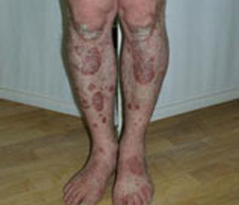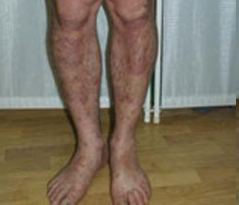Before and After Psoriasis Pictures
Are you tired of the visible and uncomfortable effects of psoriasis? At Advanced Dermatology, P.C., we understand the challenges of managing this chronic skin condition. Our goal is to help you achieve clearer, healthier skin.
Witness the remarkable transformations our patients have experienced. Our before-and-after psoriasis treatment photos showcase the effectiveness of our personalized treatment plans. From mild to severe cases, we offer a range of therapies to address your specific needs.
Discover how our expert team can help you regain confidence and improve your quality of life. Explore our psoriasis before-and-after gallery to see the results for yourself.
Ready to take the first step toward clearer skin? Contact us today for a consultation.
What is Psoriasis?
Psoriasis is a chronic autoimmune disease that causes skin cells to grow too quickly. This rapid growth leads to the buildup of thick, scaly patches on the skin, which can be itchy, painful, and embarrassing. While there’s no cure for psoriasis, effective treatments can help manage symptoms and improve quality of life.
Psoriasis can affect people of all ages and skin tones. It’s important to note that psoriasis is not contagious.
This condition manifests in various forms, each with its own characteristics. Common types include:
- Plaque psoriasis: The most common type, characterized by raised, red patches covered in white scales.
- Guttate psoriasis: Often triggered by an infection, featuring small, drop-like scaly spots.
- Inverse psoriasis: Affects skin folds and causes smooth, red patches.
- Pustular psoriasis: Characterized by pus-filled blisters on inflamed skin.
- Erythrodermic psoriasis: A severe form covering most of the body with red, peeling skin.
Various factors, including infections, injuries, stress, certain medications, weather changes, and lifestyle habits like smoking and alcohol consumption, can cause psoriasis flare-ups. Understanding your triggers is crucial for managing psoriasis.
Psoriasis Treatment: What to Expect
Managing psoriasis often requires a combination of treatments tailored to your specific needs.
Treatment options include:
- Topical medications: Creams, ointments, and lotions are applied directly to the skin to reduce inflammation and scaling.
- Light therapy: Exposure to ultraviolet light to slow skin cell growth.
- Systemic medications: Oral or injected medications for moderate to severe psoriasis.
- Biologics: Targeted therapies that suppress the immune system’s role in psoriasis.
Psoriasis improvement takes time and patience. You may notice gradual changes over several weeks or months, and your treatment plan may need adjustments as your condition evolves.
Since psoriasis is a chronic condition, long-term management is often necessary. It’s essential to discuss potential side effects with your doctor to make informed decisions about your treatment options.
Explore our psoriasis before-and-after gallery below to see the transformative results our patients have achieved.












